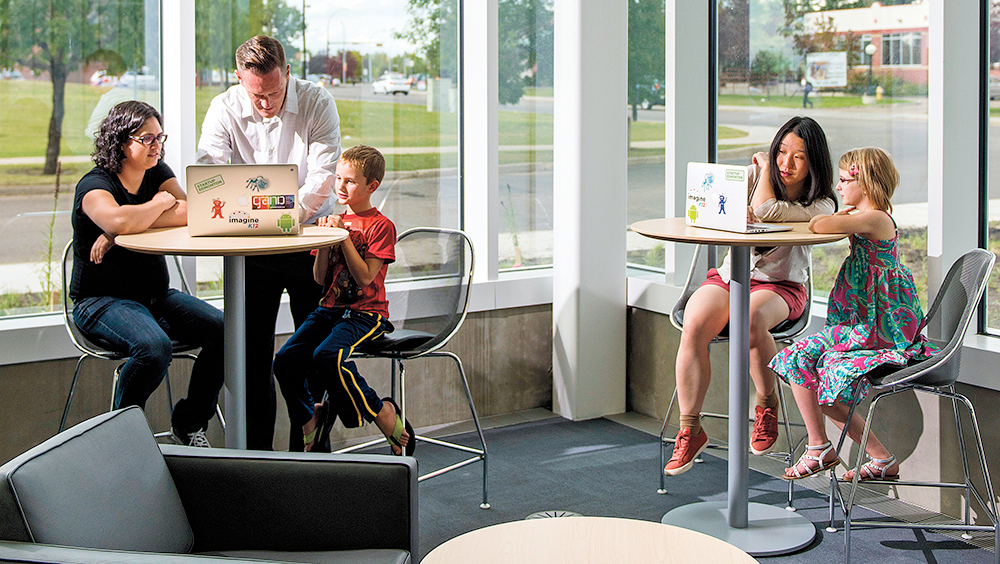
[Photo by John Ulan]
My nine-year-old daughter had a glint in her eye when I told her I had a writing game that she could play: "Really? A writing game?" I sent my computer's web browser to an online application called COW (which stands for Creative Online Writing) and left her to her awkward typing and enthusiasm.
A "game-ified" writing app that encourages users to write a minimum amount, either freely or with topic and vocabulary prompts, COW is a slick program created by then-UAlberta computing science PhD students Kit Chen and Neesha Desai.
In 2013, the pair co-founded Alieo Games, an educational technology startup, following a conversation with Chris McMahen, a retired K-12 teacher, children's book author, former librarian and Chen's friend. McMahen had seen children in his classes struggle with writing fluency even more than with spelling and grammar. (Writing fluency is the ability to express your ideas in words.) In his work, McMahen used non-computerized activities to motivate children to write. By observing variations in sentence structure and assessing to what extent the content appealed to the senses, he was able to assess his students' writing fluency.
Chen paired up with classmate Desai to build a program that would involve the same sort of prompts, challenges and assessment criteria as McMahen's activities but as a web-based application. With the help of graphic designer Joel Koop, the COW app was born.
Under Desai and Chen's leadership, the Alieo team has set out to make an impact on education in general. "We want to motivate kids to be lifelong learners, to be persistent through failure, to gain confidence through practice, to dream big and work hard," says Chen.
Fifteen minutes after riffing off COW's prompt "The hockey game ended when ... ," my daughter produced an amazing story. A "science corporation" shows up at the rink and, from a test tube, a genie emerges, announcing its plans to grant the sweaty, stinky hockey players' wishes. Except the genie is erratic: it disappears into its glass container just as it has drawn everyone's attention. After a pregnant pause, it emerges again with a tortoise shell on its back, shrieking, "Arriba!" Suddenly parsimonious, the genie grants one hockey player a wish before disappearing, leaving behind only a cryptic business card.
I submitted my daughter's story for COW's calculation, which observed that she had appealed to multiple senses, used adverbs and adjectives, and had an appropriate amount of variation in sentence construction. As a parent, I was impressed - both with my daughter and the app.
Educators, too, appreciate the app's ease of use - for instance, distributing tailored vocabulary and writing exercises to students' actual grade level - and its automatic statistics on writing complexity. K-12 students, for their part, warm to the game-like interface and the way that feedback from a computer, as Desai points out, "is somehow less judgmental" than similarly corrective feedback from a teacher. Kids, especially those who play video games, are already familiar with computer feedback and can use it to self-correct. "They might not generate something worth reading on any given day but neither do the most experienced and celebrated writers," says Chen. "The point is that in practising, [kids] increase the likelihood of having a few really standout pieces to share with their classmates and their communities."
Although COW has made big gains in the past two years - it has been in alpha testing in classrooms across Alberta and, because of one enthusiastic American educator who discovered it online, in the state of Georgia, as well - Chen and Desai have had to juggle their work as entrepreneurs with schoolwork. Thanks to awards such as the $50,000 Ross and Verna Tate Science Entrepreneurship Award, however, Chen (who is taking time off from her studies) and Desai (who graduated this past spring) will now devote full-time energies to the project.
Encouraged by the support, the pair's next big goal is to change the way writing is taught in K-12 schools. And, like the ethos of the COW program, the idea is that practice makes perfect. "We try every day to build a better COW," says Chen, "in the hopes that kids will use it to express their stories, their opinions, their ideas and, ultimately, their voice with others."
Rereading my daughter's COW assignment, I laughed at the soaring arriba. Sure, the typography veered into the, um, perplexing, but the backbone of the story left me in awe. (The comedic timing!) It amazed me that this computer game could bring out this aspect of her - that there was this capacity for crazy and meaningful storytelling within her that I had never had the chance to see before. Proud parent that I was, I asked her permission and then emailed it off to the family.
Through the Entrepreneurship@UAlberta cross-faculty initiative, the Ross and Verna Tate Science Entrepreneurship Award is awarded to a science-related startup company to further the development of a product or service. Successful startup companies are also given the opportunity to meet with venture capital funders in California.
To learn how you can help student entrepreneurs realize the potential of their great ideas, contact Andrew MacIsaac at 780-248-5776 or andrew.macisaac@ualberta.ca.